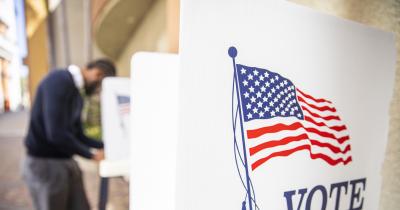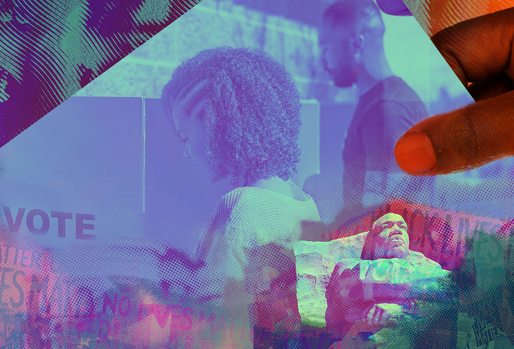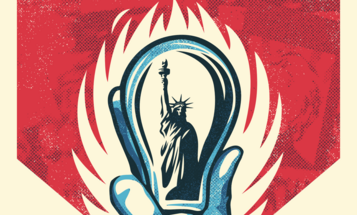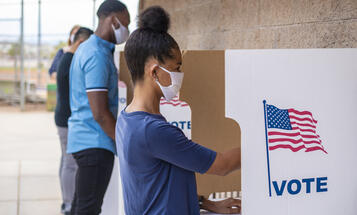
Reflections on a Radically Honest Conversation: Thinking Boldly About the Right to Vote and the Constitution
How can an affirmative constitutional amendment guaranteeing the right to vote, eliminate the symptoms of a democracy that has intentionally excluded Black and brown people?

On Constitution Day, September 17, Demos hosted an online conversation with grassroots leaders, national partners, and constitutional scholars for an intriguing conversation prompted by a new Demos proposal to advance a transformative Right-to-Vote Amendment to the Constitution for the 21st Century. The Demos proposal aims to identify the problems of voter suppression as what they are—symptoms of a democracy that intentionally excluded Black and brown people from the very beginning—and to offer a vision for a pro-democracy constitution that would make the promise of democracy real for Black and brown people and, by extension, for all people. The proposal goes beyond just securing the right to vote itself, embracing other necessary reforms such as ending disenfranchisement of people caught up in the carceral system, abolishing the Electoral College, reducing the use of gerrymandering, ensuring D.C. statehood and sovereignty for the U.S. Territories, and others.
The insights of our Constitution Day panelists, as well as the questions from the audience, were powerful and thought-provoking. Here, I’ll sum up some key points, but I encourage everyone to view the entire video.
“Why call for a pro-democracy constitutional amendment in this political moment, when we are facing the urgency of COVID-19 and the Movement for Black Lives, among other challenges?”
Laura Williamson, Senior Policy Analyst at Demos, and the lead author of the report, moderated the discussion, beginning by asking Judith Browne Dianis, Executive Director of the Advancement Project, “Why call for a pro-democracy constitutional amendment in this political moment, when we are facing the urgency of COVID-19 and the Movement for Black Lives, among other challenges?”
Judith, whose organization first drew attention to the lack of an affirmative right to vote in the Constitution after the 2000 presidential election, noted that the urgency has only increased now that we’re in a moment where people are being “forced to choose between their health and the right to vote, as if the right to vote means nothing.” She also sees, in the Movement for Black Lives, a continuation of “a long-term movement for Black people to be included in this Constitution,” and a “rebirth and reinvigoration of a movement calling for . . . the full right to citizenship” for previously excluded people.
Ivanna Gonzalez, Deputy Director of Blueprint NC, spoke from her vantage point as a leader and organizer in North Carolina. She said that the power of a conversation on the right to vote comes from it being a piece of a larger conversation on the affirmative right to participate and belong; “to have a way to manifest the collective will of the community that you belong to.” She noted that “Democracy, like any other infrastructure, can be manipulated for or against breaking down oppression.” Police unions are an example; unions generally work to empower ordinary people, but in some cases can be a tool of oppression. Ivanna lifted up the need to “build up democratic structures through an explicit racial lens and working people lens, so that those tools don’t get used against people without power.”
Andrea James is the founder and Executive Director of the National Council of Currently and Formerly Incarcerated Women and Girls, which she founded and nurtured in 2010 while incarcerated in a prison in Danbury, CT, and continued after her release. Andrea described the enormous power of people who have been directly involved with the carceral system when they organize to engage in their communities to make their voices heard. She shared a powerful example on participatory budgeting, when the National Council participated directly in the local budgeting process: the members saw first-hand the massive investments in police and prisons, compared to almost no investment in the needs of Black communities that are the targets of over-policing. Laura noted the power of this experience: it shows that whatever our policy ideas, we can only make progress through organizing among the communities directly affected.
Judith has worked closely with Andrea and her organization, and she expanded on Andrea’s comments by talking about the value of a Right-to-Vote constitutional amendment as an organizing strategy. “The more we can get people to imagine a country where the democracy is theirs; that they own it; that it is not owned by the people sitting in Congress and state legislatures, but it is theirs, because they own it—then we will have a different level of participation” that lifts up the voices that have been excluded.
The current Constitution contains no positive federal right to vote—only negative prohibitions against denying the right to vote based on race, gender, age.
The discussion was rounded out with observations by constitutional scholar Guy-Uriel Charles, the Edward and Ellen Schwarzman Professor of Law at Duke University Law School. Guy’s scholarly work has focused on race and the Constitution, and race and law. The right to vote is where those issues intersect, and he sees the current Constitution as seriously deficient in protecting the right to vote, in at least three key ways. First, the current Constitution contains no positive federal right to vote—only negative prohibitions against denying the right to vote based on race, gender, age. It leaves it up to the states to define who can participate in elections. Contrast this with constitutions of other countries, such as South Africa, whose constitution affirmatively provides that all eligible persons have the right to vote for every legislative body.
Second, as Guy pointed out, our constitutional system decentralizes the administration of elections—we have 13,000 different state and local election authorities making their own rules on participation. Finally, in the U.S., voters bear the burden of figuring out how to participate in elections. Other countries take responsibility to ensure that all eligible persons are registered. Guy views all of these problems as calling for a constitutional amendment to fully protect the right to vote.
The proposal that Demos has put forward for creating a fully pro-democracy constitution seeks to address the full set of policy issues that our panelists put forward; but even more importantly, we embrace the requirement for any policy advocacy to be embedded in organizing strategies centering the needs, priorities, and leadership of Black and brown communities. Demos looks forward to continuing the conversation we started on Constitution Day by engaging with other partners and movement leaders on what we need to design a Constitution that fixes the serious flaws in our democracy.





